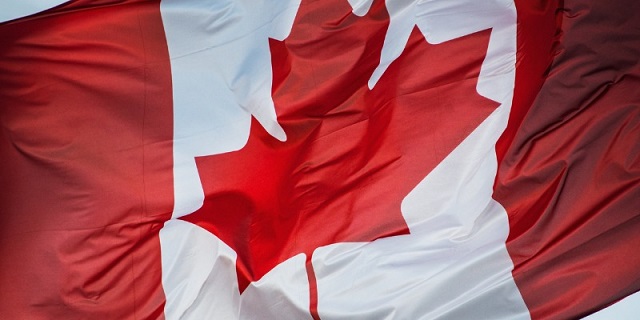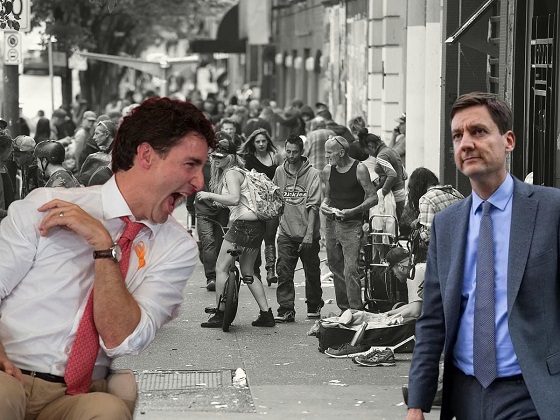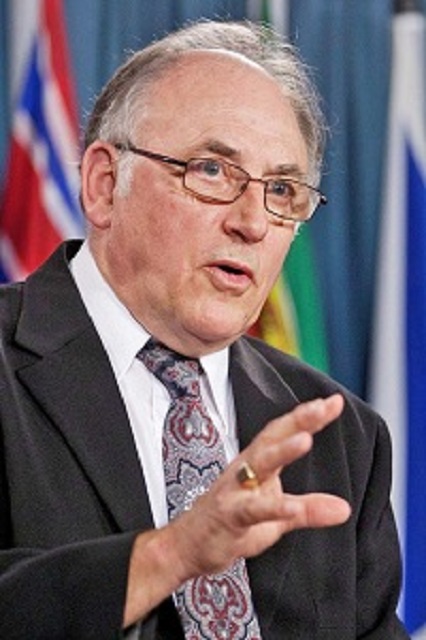Economy
24 facts for 2024—Canadians should understand impact of government policies

From the Fraser Institute
With a better understanding of the impact of government policies, Canadians will be better able to hold politicians accountable and make informed decisions at the ballot box. With the calendar now turned to 2024, here are 24 facts for Canadians to consider.
Canada’s Economic Crisis
- Average per-person incomes in Canada have stagnated from 2016 ($54,154) to 2022 ($55,863). Meanwhile, the United States has seen an increase from $65,792 to $73,565. The average Canadian now earns $17,700 less annually than the average American.
- Canada ranks just below Louisiana ($57,954) in average per-person income and slightly ahead Kentucky ($54,671). Is this the company we want to keep?
- According to the Organisation for Economic Co-operation and Development, Canada will be the worst-performing advanced economy from 2020 to 2030 and from 2030 to 2060.
- Canada’s economic growth crisis is due in large part to the decline in business investment. Business investment per worker in Canada declined by 20 per cent since 2014, from $18,363 to $14,687.
- In 2014, Canada invested about 79 cents per worker for every dollar invested in the United States—in 2021, investment was 55 cents for every U.S. dollar.
- We’ve witnessed a massive flight of capital from Canada since 2014, to the tune of more than $285 billion.
- From the onset of the COVID recession in February 2020 to June 2023, the number of government jobs across the country increased by 11.8 per cent compared to only 3.3 per cent in the private sector (including the self-employed).
Fiscal Crisis: Imprudent Spending and Massive Deficits
- The Trudeau government has increased annual spending (not including interest payments on its debt) by nearly 75 per cent since 2014, from $256 billion in 2014-15 to a projected $453 billion in 2023-24.
- With federal spending at nearly $11,500 per Canadian, the Trudeau government is on track to record the five highest levels of per-person spending in Canadian history.
- A large portion of government spending in Canada goes to pay for the 4.1 million federal, provincial and local government employees. Government employees across Canada—including federal, provincial and municipal workers—are paid 31.3 per cent higher wages (on average) than workers in the private sector. Even after adjusting for differences (education, tenure, type of work, occupation, etc.) government employees are still paid 8.5 per cent higher wages.
- The Trudeau government has used large increases in borrowing and tax increases to finance this spending. Federal debt has ballooned to $1.9 trillion (2022-23) will reach a projected $2.4 trillion by 2027/28.
- Combined federal and provincial debt in Canada has nearly doubled from $1.18 trillion in 2007/08 (the year before the last recession) to a projected $2.18 trillion this year.

Tax Increases and Canada’s Affordability Crisis
- To pay for all this spending, the total tax bill for the average Canadian family was $48,199 or 45.3 per cent per cent of its income—more than what the average family spends on housing, food and clothing combined.

- Housing and grocery costs dominated the news last year but in 2022 the average family spent $1,452 more on housing and $996 more on food while governments extracted an extra $4,566 from the average family in taxes.
- While the federal government has claimed it “cut taxes for middle-class Canadians everywhere,” in reality 86 per cent of middle-class families in Canada are paying higher income taxes under the government’s personal income tax changes. And that doesn’t account for carbon taxes, etc.
- More than 60 per cent of lower-income families (those in the bottom 20 per cent of earners) in Canada now pay higher federal income taxes because of the federal government’s tax changes.
- Seventy-four per cent of Canadians surveyed believe the average family is being overtaxed by the federal, provincial and local governments.
Damaging Energy and Environment Policy
- In the federal government, there’s a common belief that the Canadian economy is undergoing a fundamental and rapid transition towards “clean/green” industries. Yet despite massive regulations and subsidies, Statistics Canada data shows that Canada’s “green” economy amounts to only about 3 per cent of gross domestic product (GDP) and directly employs roughly 1.6 per cent of all jobs.
- The recent United Nations climate change conference pushed for a “transition away from fossil fuels.” Despite significant spending on “clean energy”, from 1995 to 2022, the amount of fossil fuels (oil, gas and coal) consumed worldwide actually increased by nearly 59 per cent.
- Canada has an opportunity to serve the world with its energy and resources and, in doing so, benefit our allies and improve both world energy security and the environment. But the federal government doesn’t see it that way. How else could one explain the latest singling out of Canada’s oil and gas sector through an arbitrary cap on greenhouse gas emissions, even though the sector only represents 26 per cent of Canada’s total GHG emissions? Even if Canada eliminated all greenhouse gas emissions expected from the oil and gas sector in 2030, the reduction would equal only 0.004 per cent of global emissions while imposing huge costs.

- As a result of new federal energy efficiency regulations, the cost of a newly constructed home in Canada will increase by $55,000, on average, by 2030 because of the federal government’s stricter energy efficiency regulations for buildings. Rather than increasing the costs of new homes, governments should help close the gap between supply and demand.
Our Failing Health-Care System
- How good is our health-care system? Canada’s average health-care wait times hit 27.7 weeks in 2023—the longest ever recorded and nearly 200 per cent longer than the 9.3 weeks in 1993 when the Fraser Institute began tracking wait times.
- Among a group of 30 high-income countries that have universally accessible health care, Canada spends the most money on health care as a percentage of GDP.
- Despite this high spending, we are a poor performer. Among this group, Canada had the longest wait lists and ranked:
- 28th (out of 30) for the number of doctors
- 23rd (out of 29) for the number of hospital beds available
- 23rd (out of 29) for the number of psychiatric beds available
- 25th (out of 29) for the number of MRI machines
- 26th (out of 30) for CT scanners
Author:
Business
Taxpayers criticize Trudeau and Ford for Honda deal

From the Canadian Taxpayers Federation
Author: Jay Goldberg
The Canadian Taxpayers Federation is criticizing the Trudeau and Ford governments to for giving $5 billion to the Honda Motor Company.
“The Trudeau and Ford governments are giving billions to yet another multinational corporation and leaving middle-class Canadians to pay for it,” said Jay Goldberg, CTF Ontario Director. “Prime Minister Justin Trudeau is sending small businesses bigger a bill with his capital gains tax hike and now he’s handing out billions more in corporate welfare to a huge multinational.
“This announcement is fundamentally unfair to taxpayers.”
The Trudeau government is giving Honda $2.5 billion. The Ford government announced an additional $2.5 billion subsidies for Honda.
The federal and provincial governments claim this new deal will create 1,000 new jobs, according to media reports. Even if that’s true, the handout will cost taxpayers $5 million per job. And according to Globe and Mail investigation, the government doesn’t even have a proper process in place to track whether promised jobs are actually created.
The Parliamentary Budget Officer has also called into question the government’s claims when it made similar multi-billion-dollar handouts to other multinational corporations.
“The break-even timeline for the $28.2 billion in production subsidies announced for Stellantis-LGES and Volkswagen is estimated to be 20 years, significantly longer than the government’s estimate of a payback within five years for Volkswagen,” wrote the Parliamentary Budget Officer said.
“If politicians want to grow the economy, they should cut taxes and red tape and cancel the corporate welfare,” said Franco Terrazzano, CTF Federal Director. “Just days ago, Trudeau said he wants the rich to pay more, so he should make rich multinational corporations pay for their own factories.”
Business
Maxime Bernier warns Canadians of Trudeau’s plan to implement WEF global tax regime

From LifeSiteNews
If ‘the idea of a global corporate tax becomes normalized, we may eventually see other agreements to impose other taxes, on carbon, airfare, or who knows what.’
People’s Party of Canada leader Maxime Bernier has warned that the Liberal government’s push for World Economic Forum (WEF) “Global Tax” scheme should concern Canadians.
According to Canada’s 2024 Budget, Prime Minister Justin Trudeau is working to pass the WEF’s Global Minimum Tax Act which will mandate that multinational companies pay a minimum tax rate of 15 percent.
“Canadians should be very concerned, for several reasons,” People’s Party leader Maxime Bernier told LifeSiteNews, in response to the proposal.
“First, the WEF is a globalist institution that actively campaigns for the establishment of a world government and for the adoption of socialist, authoritarian, and reactionary anti-growth policies across the world,” he explained. “Any proposal they make is very likely not in the interest of Canadians.”
“Second, this minimum tax on multinationals is a way to insidiously build support for a global harmonized tax regime that will lower tax competition between countries, and therefore ensure that taxes can stay higher everywhere,” he continued.
“Canada reaffirms its commitment to Pillar One and will continue to work diligently to finalize a multilateral treaty and bring the new system into effect as soon as a critical mass of countries is willing,” the budget stated.
“However, in view of consecutive delays internationally in implementing the multilateral treaty, Canada cannot continue to wait before taking action,” it continued.
The Trudeau government also announced it would be implementing “Pillar Two,” which aims to establish a global minimum corporate tax rate.
“Pillar Two of the plan is a global minimum tax regime to ensure that large multinational corporations are subject to a minimum effective tax rate of 15 per cent on their profits wherever they do business,” the Liberals explained.
“The federal government is moving ahead with legislation to implement the regime in Canada, following consultations last summer on draft legislative proposals for the new Global Minimum Tax Act,” it continued.
According to the budget, Trudeau promised to introduce the new legislation in Parliament soon.
The global tax was first proposed by Secretary-General of Amnesty International at the WEF meeting in Davos this January.
“Let’s start taxing carbon…[but] not just carbon tax,” the head of Amnesty International, Agnes Callamard, said during a panel discussion.
According to the WEF, the tax, proposed by the Organization for Economic Co-operation and Development (OECD), “imposes a minimum effective rate of 15% on corporate profits.”
Following the meeting, 140 countries, including Canada, pledged to impose the tax.
While a tax on large corporations does not necessarily sound unethical, implementing a global tax appears to be just the first step in the WEF’s globalization plan by undermining the sovereignty of nations.
While Bernier explained that multinationals should pay taxes, he argued it is the role of each country to determine what those taxes are.
“The logic of pressuring countries with low taxes to raise them is that it lessens fiscal competition and makes it then less costly and easier for countries with higher taxes to keep them high,” he said.
Bernier pointed out that competition is good since it “forces everyone to get better and more efficient.”
“In the end, we all end up paying for taxes, even those paid by multinationals, as it causes them to raise prices and transfer the cost of taxes to consumers,” he warned.
Bernier further explained that the new tax could be a first step “toward the implementation of global taxes by the United Nations or some of its agencies, with the cooperation of globalist governments like Trudeau’s willing to cede our sovereignty to these international organizations.”
“Just like ‘temporary taxes’ (like the income tax adopted during WWI) tend to become permanent, ‘minimum taxes’ tend to be raised,” he warned. “And if the idea of a global corporate tax becomes normalized, we may eventually see other agreements to impose other taxes, on carbon, airfare, or who knows what.”
Trudeau’s involvement in the WEF’s plan should not be surprising considering his current environmental goals – which are in lockstep with the United Nations’ 2030 Agenda for Sustainable Development – which include the phasing out coal-fired power plants, reducing fertilizer usage, and curbing natural gas use over the coming decades.
The reduction and eventual elimination of so-called “fossil fuels” and a transition to unreliable “green” energy has also been pushed by the World Economic Forum – the aforementioned group famous for its socialist “Great Reset” agenda – in which Trudeau and some of his cabinet are involved.
-

 Alberta23 hours ago
Alberta23 hours agoRed Deer Doctor critical of Alberta’s COVID response to submit report to Danielle Smith this May
-

 conflict1 day ago
conflict1 day agoCol. Douglas Macgregor torches Trump over support for bill funding wars in Ukraine and Israel
-

 Censorship Industrial Complex2 days ago
Censorship Industrial Complex2 days agoDesperate Liberals move to stop MPs from calling Trudeau ‘corrupt’
-

 Business6 hours ago
Business6 hours agoDon’t be fooled by high-speed rail
-

 Alberta6 hours ago
Alberta6 hours agoActivity-Based Hospital Funding in Alberta: Insights from Quebec and Australia
-

 Business2 days ago
Business2 days agoFederal government’s ‘fudget budget’ relies on fanciful assumptions of productivity growth
-

 Health1 day ago
Health1 day agoTransgender activists are threatening the author of scathing UK report on child ‘sex changes’
-

 Business4 hours ago
Business4 hours agoUN plastics plans are unscientific and unrealistic








